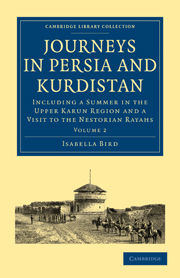 Journeys in Persia and Kurdistan
Journeys in Persia and Kurdistan Book contents
- Frontmatter
- LIST OF ILLUSTRATIONS
- LETTER XVI
- LETTER XVII
- LETTER XVIII
- LETTER XVIII (Continued)
- LETTER XIX
- LETTER XX
- LETTER XXI
- LETTER XXII
- LETTER XXIII
- LETTER XXIV
- LETTER XXV
- LETTER XXV (Continued)
- LETTER XXVI
- NOTES ON PROTESTANT MISSIONS IN URMI
- LETTER XXVII
- FAREWELL IMPRESSIONS OF PERSIA
- LETTER XXVIII
- LETTER XXIX
- LETTER XXIX (Continued)
- LETTER XXX
- LETTER XXXI
- LETTER XXXII
- LETTER XXXIII
- LETTER XXXIV
- LETTER XXXV
- APPENDIX A
- APPENDIX B
- INDEX
- Plate section
FAREWELL IMPRESSIONS OF PERSIA
Published online by Cambridge University Press: 10 November 2010
- Frontmatter
- LIST OF ILLUSTRATIONS
- LETTER XVI
- LETTER XVII
- LETTER XVIII
- LETTER XVIII (Continued)
- LETTER XIX
- LETTER XX
- LETTER XXI
- LETTER XXII
- LETTER XXIII
- LETTER XXIV
- LETTER XXV
- LETTER XXV (Continued)
- LETTER XXVI
- NOTES ON PROTESTANT MISSIONS IN URMI
- LETTER XXVII
- FAREWELL IMPRESSIONS OF PERSIA
- LETTER XXVIII
- LETTER XXIX
- LETTER XXIX (Continued)
- LETTER XXX
- LETTER XXXI
- LETTER XXXII
- LETTER XXXIII
- LETTER XXXIV
- LETTER XXXV
- APPENDIX A
- APPENDIX B
- INDEX
- Plate section
Summary
In the letters by which this chapter is preceded few general opinions have been expressed on Persia, its government, and its people, but now that I contemplate them with some regard to perspective, and have reversed some of my earlier and hastier judgments, I will, with the reader's permission, give some of the impressions formed during a journey extending over nine months, chiefly in the western and south-western portions of the Empire.
On the pillared plain of Persepolis, on the bull flanked portals which tower above the Hall of Xerxes, the Palace of Darius, and the stairways with the sculptured bas-reliefs, which portray the magnificence, the military triumphs, and the religious ceremonial of the greatest of the Persian monarchs, runs the stately inscription: “I am Xerxes the King, the Great King, the King of Kings, the King of the many-peopled countries, the Upholder of the Great World, the son of Darius the King, the Achæmenian”; and on the tablets on the rock of Besitun is inscribed in language as august the claim of Darius the Mede to a dominion which in his day was regarded as nearly universal.
The twenty-four centuries which have passed since these claims were made have seen the ruin of the Palace-Temples of Persepolis, the triumph of Islam over Zoro astrianism, the devastating sweep of the hordes of Taimur lane and other semi-barbaric conquerors, the destruction of ancient art and frontiers, and the compression of the Empire within comparatively narrow limits.
- Type
- Chapter
- Information
- Journeys in Persia and KurdistanIncluding a Summer in the Upper Karun Region and a Visit to the Nestorian Rayahs, pp. 246 - 260Publisher: Cambridge University PressPrint publication year: 2010First published in: 1891


